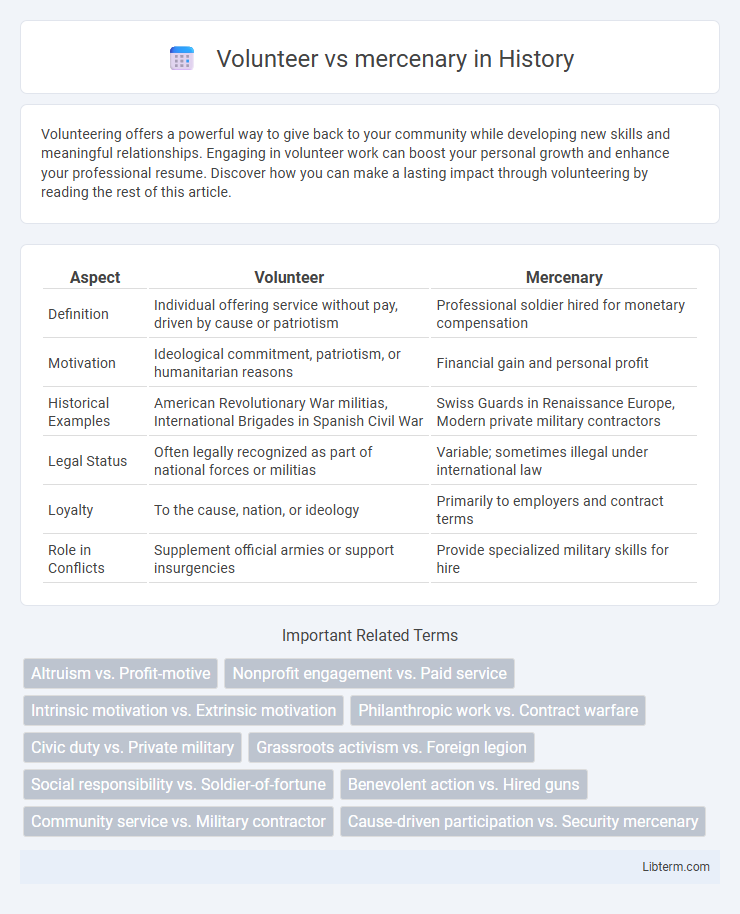Volunteering offers a powerful way to give back to your community while developing new skills and meaningful relationships. Engaging in volunteer work can boost your personal growth and enhance your professional resume. Discover how you can make a lasting impact through volunteering by reading the rest of this article.
Table of Comparison
| Aspect | Volunteer | Mercenary |
|---|---|---|
| Definition | Individual offering service without pay, driven by cause or patriotism | Professional soldier hired for monetary compensation |
| Motivation | Ideological commitment, patriotism, or humanitarian reasons | Financial gain and personal profit |
| Historical Examples | American Revolutionary War militias, International Brigades in Spanish Civil War | Swiss Guards in Renaissance Europe, Modern private military contractors |
| Legal Status | Often legally recognized as part of national forces or militias | Variable; sometimes illegal under international law |
| Loyalty | To the cause, nation, or ideology | Primarily to employers and contract terms |
| Role in Conflicts | Supplement official armies or support insurgencies | Provide specialized military skills for hire |
Understanding the Definitions: Volunteer vs Mercenary
Volunteers engage in activities driven by altruistic motives and personal commitment without expecting financial reward, often supporting humanitarian, social, or community causes. Mercenaries, by definition, are individuals hired to fight or perform services in exchange for monetary compensation, lacking allegiance to the entity they serve beyond payment. Recognizing these distinctions is crucial for understanding their roles, motivations, and legal implications under international law.
Historical Context: Origins of Volunteers and Mercenaries
Volunteers have historically emerged from patriotic or ideological motivations, often linked to national or community defense during conflicts such as the American Revolutionary War and the Spanish Civil War. Mercenaries trace their origins to ancient times, notably in the Greek and Roman eras, where soldiers were hired for payment without allegiance to the employing state's cause. The distinction between volunteers and mercenaries is rooted in their fundamental motivations: volunteers act out of loyalty or belief, whereas mercenaries are driven by financial compensation.
Motivations: Altruism vs Financial Incentive
Volunteers are primarily driven by altruism, seeking to contribute their time and skills to causes they believe in without expecting monetary compensation. Mercenaries, in contrast, are motivated mainly by financial incentives, offering their services in exchange for payment regardless of the cause. This fundamental difference in motivation shapes their commitment, loyalty, and the ethical frameworks within which they operate.
Legal Status and International Regulations
Volunteers typically operate under humanitarian or non-combatant roles recognized by international law, often protected by the Geneva Conventions as civilians or lawful combatants. Mercenaries, defined by the International Convention against the Recruitment, Use, Financing and Training of Mercenaries, lack these protections due to their primary motivation by private gain and are subject to prosecution by national and international courts. The legal status of mercenaries involves criminal liability and exclusion from prisoner-of-war status, contrasting with volunteers who may receive combatant immunity if aligned with legitimate armed forces.
Roles in Armed Conflict: Volunteers and Mercenaries Compared
Volunteers in armed conflict often join motivated by ideological beliefs, patriotism, or humanitarian goals, operating within regular military or recognized paramilitary forces. Mercenaries, typically driven by financial gain, serve as private soldiers without official allegiance to a state, often working for private military companies or employers lacking lawful authority. The distinction impacts international law, with volunteers usually protected under the Geneva Conventions, while mercenaries face limited legal protections and are subject to prosecution for participating in hostilities.
Public Perception and Media Representation
Volunteers are often depicted in media as selfless heroes driven by altruism and commitment to a cause, fostering positive public perception rooted in honor and sacrifice. In contrast, mercenaries frequently face portrayal as opportunistic and morally ambiguous figures motivated by financial gain, leading to widespread skepticism and negative public sentiment. These contrasting narratives significantly shape societal attitudes, influencing support, trust, and legitimacy attributed to each group.
Ethical Dilemmas and Moral Debates
Volunteers often face ethical dilemmas related to altruism and personal sacrifice, balancing their moral duty to help others against potential risks and resource limitations. Mercenaries encounter complex moral debates surrounding loyalty, profit-driven motives, and the legitimacy of their involvement in conflicts where financial gain may overshadow ethical considerations. Both roles highlight the tension between ethical principles and practical realities in conflict zones, challenging notions of honor, responsibility, and human rights.
Impact on Conflict Outcomes
Volunteers often bring intrinsic motivation, local knowledge, and community support, which can enhance morale and legitimacy in conflict zones, contributing to sustainable and positive outcomes. Mercenaries, driven primarily by financial incentives, may provide professional military skills but can undermine long-term stability due to lack of commitment to political or social objectives. The presence of volunteers typically fosters resilience and grassroots engagement, while reliance on mercenaries risks prolonging conflict and eroding trust among local populations.
Notable Examples Throughout History
Notable examples of volunteers include the International Brigades during the Spanish Civil War, where thousands joined ideologically to support the Republican cause. In contrast, mercenaries like the White Company in 14th-century Italy operated primarily for payment, offering military services to the highest bidder. The French Foreign Legion today blends aspects of both, recruiting individuals who volunteer for service yet often motivated by financial and career incentives.
Volunteerism and Mercenarism in Modern Times
Volunteerism in modern times emphasizes altruism, civic engagement, and community building, often driven by intrinsic motivation and social responsibility. Mercenarism entails professionals motivated by financial compensation, providing military or security services under contractual agreements, typically in conflict zones. The distinction lies in purpose and commitment, with volunteers fostering societal welfare, whereas mercenaries prioritize economic gain and strategic military objectives.
Volunteer Infographic

 libterm.com
libterm.com